Education: Purposes, Contributions, Teachers' Role, and Social Science
VerifiedAdded on 2020/05/28
|18
|5609
|33
Essay
AI Summary
This essay delves into the multifaceted purposes and contributions of education, highlighting its role in transferring knowledge, fostering a fairer society, and preparing individuals for adult life. It explores the evolution of educational goals, emphasizing intellectual, political, economic, and social dimensions, and underscores the importance of lifelong learning. The essay also examines the crucial role of teachers in continuous self-evaluation and education, and the significance of instilling essential character traits like optimism and inquisitiveness. Furthermore, it discusses the impact of social science as a subject, its importance in understanding societal structures, and its contribution to individual development and critical thinking. The essay emphasizes education's transformative power, its ability to add value to life, and its role in developing leaders and visionaries. Ultimately, the essay views education as a flexible discipline essential for individual and societal progress.
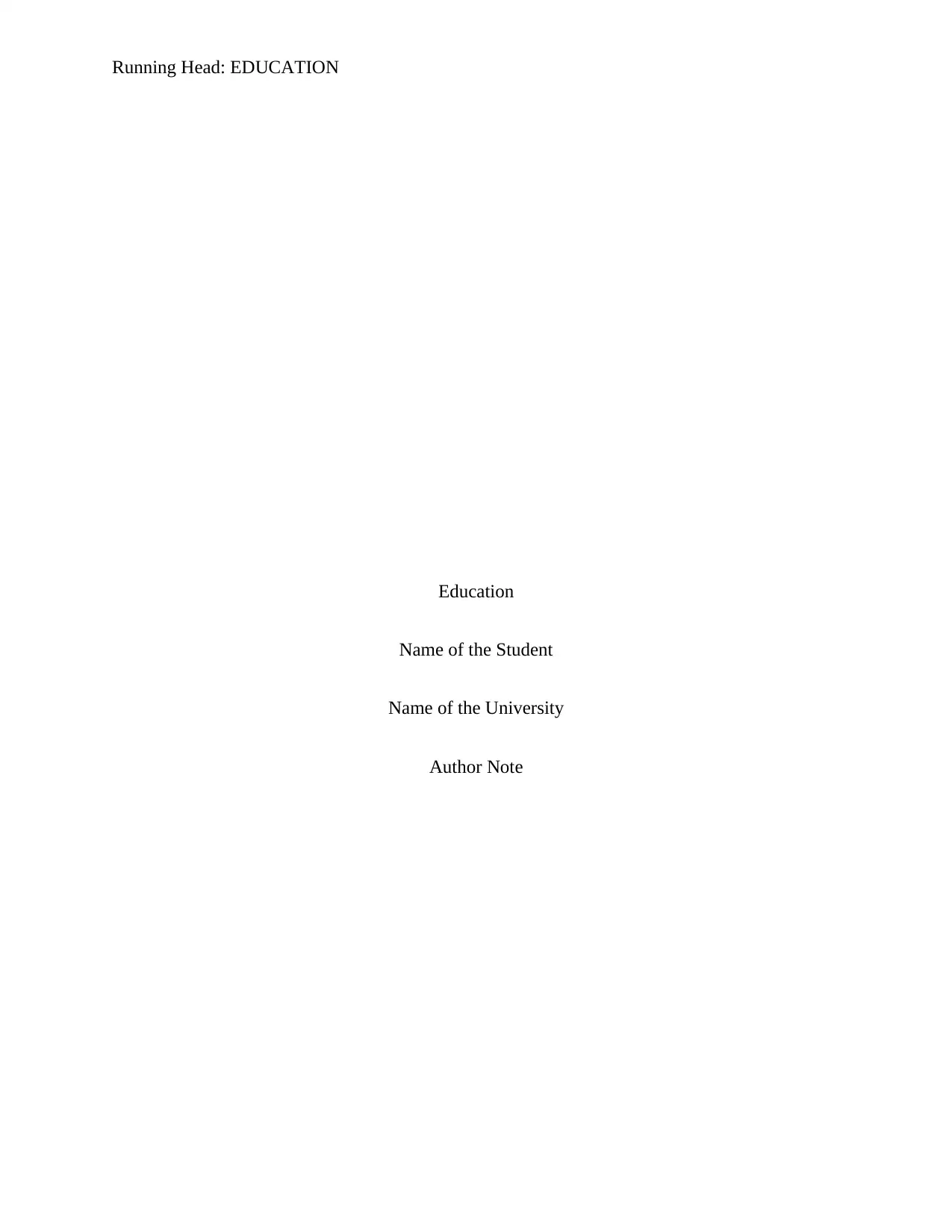
Running Head: EDUCATION
Education
Name of the Student
Name of the University
Author Note
Education
Name of the Student
Name of the University
Author Note
Paraphrase This Document
Need a fresh take? Get an instant paraphrase of this document with our AI Paraphraser
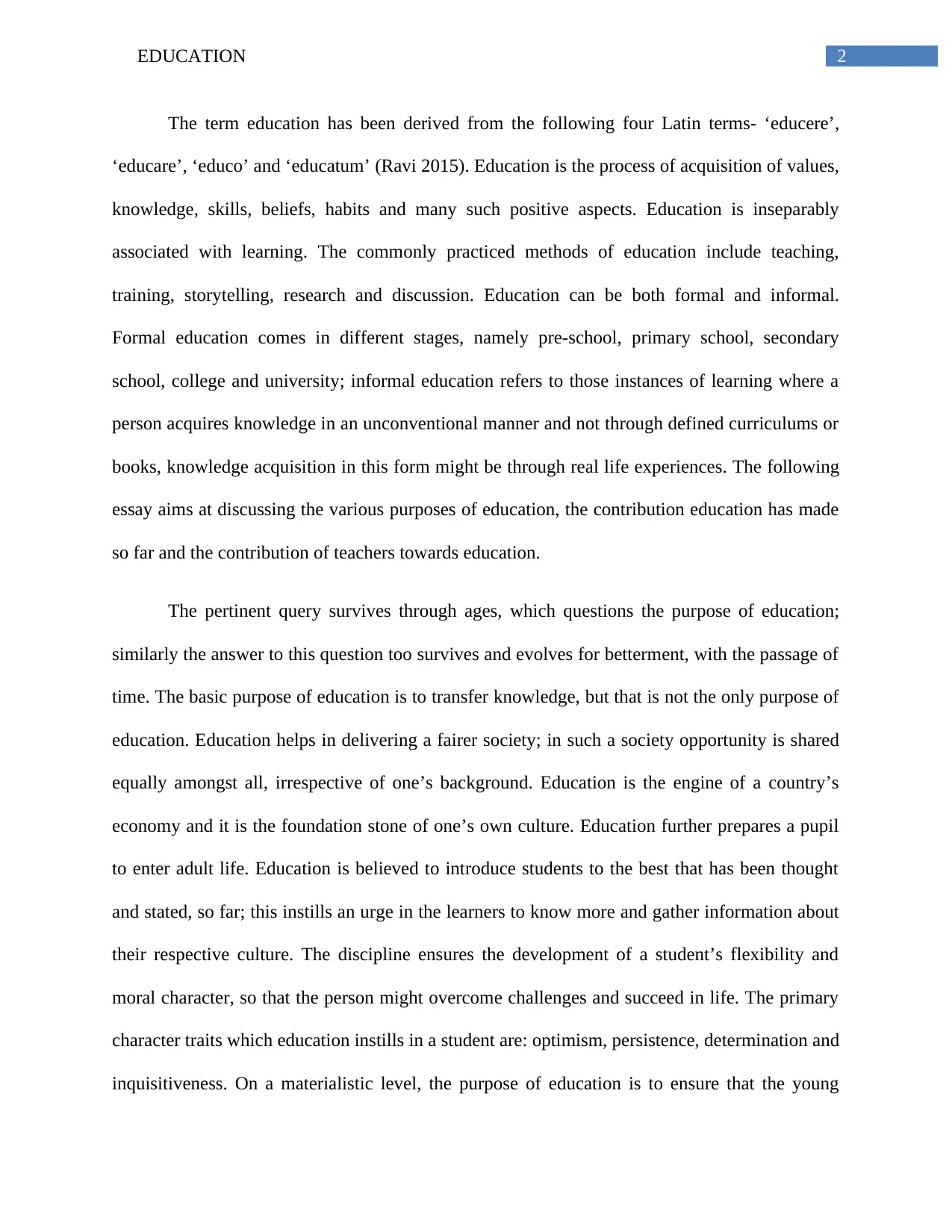
2EDUCATION
The term education has been derived from the following four Latin terms- ‘educere’,
‘educare’, ‘educo’ and ‘educatum’ (Ravi 2015). Education is the process of acquisition of values,
knowledge, skills, beliefs, habits and many such positive aspects. Education is inseparably
associated with learning. The commonly practiced methods of education include teaching,
training, storytelling, research and discussion. Education can be both formal and informal.
Formal education comes in different stages, namely pre-school, primary school, secondary
school, college and university; informal education refers to those instances of learning where a
person acquires knowledge in an unconventional manner and not through defined curriculums or
books, knowledge acquisition in this form might be through real life experiences. The following
essay aims at discussing the various purposes of education, the contribution education has made
so far and the contribution of teachers towards education.
The pertinent query survives through ages, which questions the purpose of education;
similarly the answer to this question too survives and evolves for betterment, with the passage of
time. The basic purpose of education is to transfer knowledge, but that is not the only purpose of
education. Education helps in delivering a fairer society; in such a society opportunity is shared
equally amongst all, irrespective of one’s background. Education is the engine of a country’s
economy and it is the foundation stone of one’s own culture. Education further prepares a pupil
to enter adult life. Education is believed to introduce students to the best that has been thought
and stated, so far; this instills an urge in the learners to know more and gather information about
their respective culture. The discipline ensures the development of a student’s flexibility and
moral character, so that the person might overcome challenges and succeed in life. The primary
character traits which education instills in a student are: optimism, persistence, determination and
inquisitiveness. On a materialistic level, the purpose of education is to ensure that the young
The term education has been derived from the following four Latin terms- ‘educere’,
‘educare’, ‘educo’ and ‘educatum’ (Ravi 2015). Education is the process of acquisition of values,
knowledge, skills, beliefs, habits and many such positive aspects. Education is inseparably
associated with learning. The commonly practiced methods of education include teaching,
training, storytelling, research and discussion. Education can be both formal and informal.
Formal education comes in different stages, namely pre-school, primary school, secondary
school, college and university; informal education refers to those instances of learning where a
person acquires knowledge in an unconventional manner and not through defined curriculums or
books, knowledge acquisition in this form might be through real life experiences. The following
essay aims at discussing the various purposes of education, the contribution education has made
so far and the contribution of teachers towards education.
The pertinent query survives through ages, which questions the purpose of education;
similarly the answer to this question too survives and evolves for betterment, with the passage of
time. The basic purpose of education is to transfer knowledge, but that is not the only purpose of
education. Education helps in delivering a fairer society; in such a society opportunity is shared
equally amongst all, irrespective of one’s background. Education is the engine of a country’s
economy and it is the foundation stone of one’s own culture. Education further prepares a pupil
to enter adult life. Education is believed to introduce students to the best that has been thought
and stated, so far; this instills an urge in the learners to know more and gather information about
their respective culture. The discipline ensures the development of a student’s flexibility and
moral character, so that the person might overcome challenges and succeed in life. The primary
character traits which education instills in a student are: optimism, persistence, determination and
inquisitiveness. On a materialistic level, the purpose of education is to ensure that the young
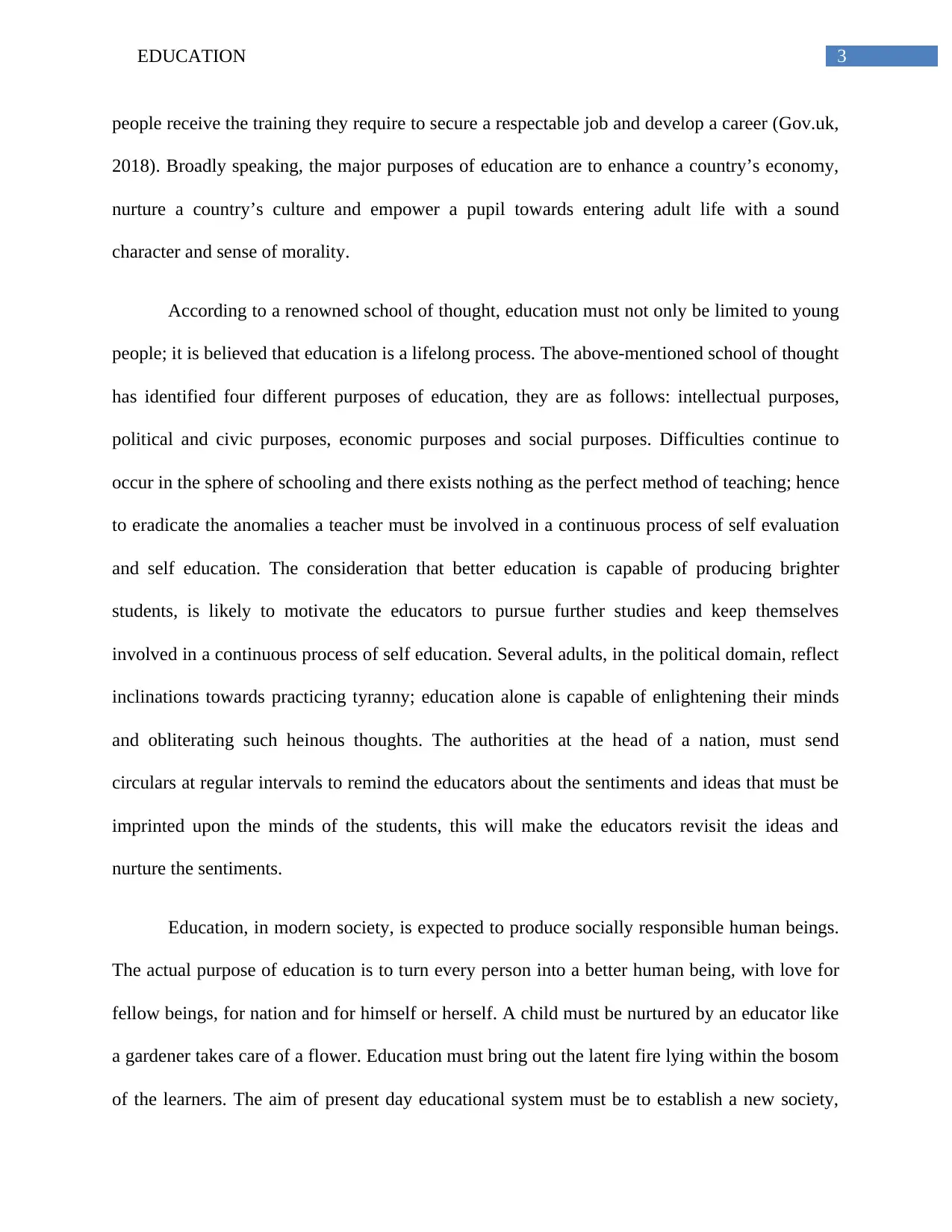
3EDUCATION
people receive the training they require to secure a respectable job and develop a career (Gov.uk,
2018). Broadly speaking, the major purposes of education are to enhance a country’s economy,
nurture a country’s culture and empower a pupil towards entering adult life with a sound
character and sense of morality.
According to a renowned school of thought, education must not only be limited to young
people; it is believed that education is a lifelong process. The above-mentioned school of thought
has identified four different purposes of education, they are as follows: intellectual purposes,
political and civic purposes, economic purposes and social purposes. Difficulties continue to
occur in the sphere of schooling and there exists nothing as the perfect method of teaching; hence
to eradicate the anomalies a teacher must be involved in a continuous process of self evaluation
and self education. The consideration that better education is capable of producing brighter
students, is likely to motivate the educators to pursue further studies and keep themselves
involved in a continuous process of self education. Several adults, in the political domain, reflect
inclinations towards practicing tyranny; education alone is capable of enlightening their minds
and obliterating such heinous thoughts. The authorities at the head of a nation, must send
circulars at regular intervals to remind the educators about the sentiments and ideas that must be
imprinted upon the minds of the students, this will make the educators revisit the ideas and
nurture the sentiments.
Education, in modern society, is expected to produce socially responsible human beings.
The actual purpose of education is to turn every person into a better human being, with love for
fellow beings, for nation and for himself or herself. A child must be nurtured by an educator like
a gardener takes care of a flower. Education must bring out the latent fire lying within the bosom
of the learners. The aim of present day educational system must be to establish a new society,
people receive the training they require to secure a respectable job and develop a career (Gov.uk,
2018). Broadly speaking, the major purposes of education are to enhance a country’s economy,
nurture a country’s culture and empower a pupil towards entering adult life with a sound
character and sense of morality.
According to a renowned school of thought, education must not only be limited to young
people; it is believed that education is a lifelong process. The above-mentioned school of thought
has identified four different purposes of education, they are as follows: intellectual purposes,
political and civic purposes, economic purposes and social purposes. Difficulties continue to
occur in the sphere of schooling and there exists nothing as the perfect method of teaching; hence
to eradicate the anomalies a teacher must be involved in a continuous process of self evaluation
and self education. The consideration that better education is capable of producing brighter
students, is likely to motivate the educators to pursue further studies and keep themselves
involved in a continuous process of self education. Several adults, in the political domain, reflect
inclinations towards practicing tyranny; education alone is capable of enlightening their minds
and obliterating such heinous thoughts. The authorities at the head of a nation, must send
circulars at regular intervals to remind the educators about the sentiments and ideas that must be
imprinted upon the minds of the students, this will make the educators revisit the ideas and
nurture the sentiments.
Education, in modern society, is expected to produce socially responsible human beings.
The actual purpose of education is to turn every person into a better human being, with love for
fellow beings, for nation and for himself or herself. A child must be nurtured by an educator like
a gardener takes care of a flower. Education must bring out the latent fire lying within the bosom
of the learners. The aim of present day educational system must be to establish a new society,
⊘ This is a preview!⊘
Do you want full access?
Subscribe today to unlock all pages.

Trusted by 1+ million students worldwide
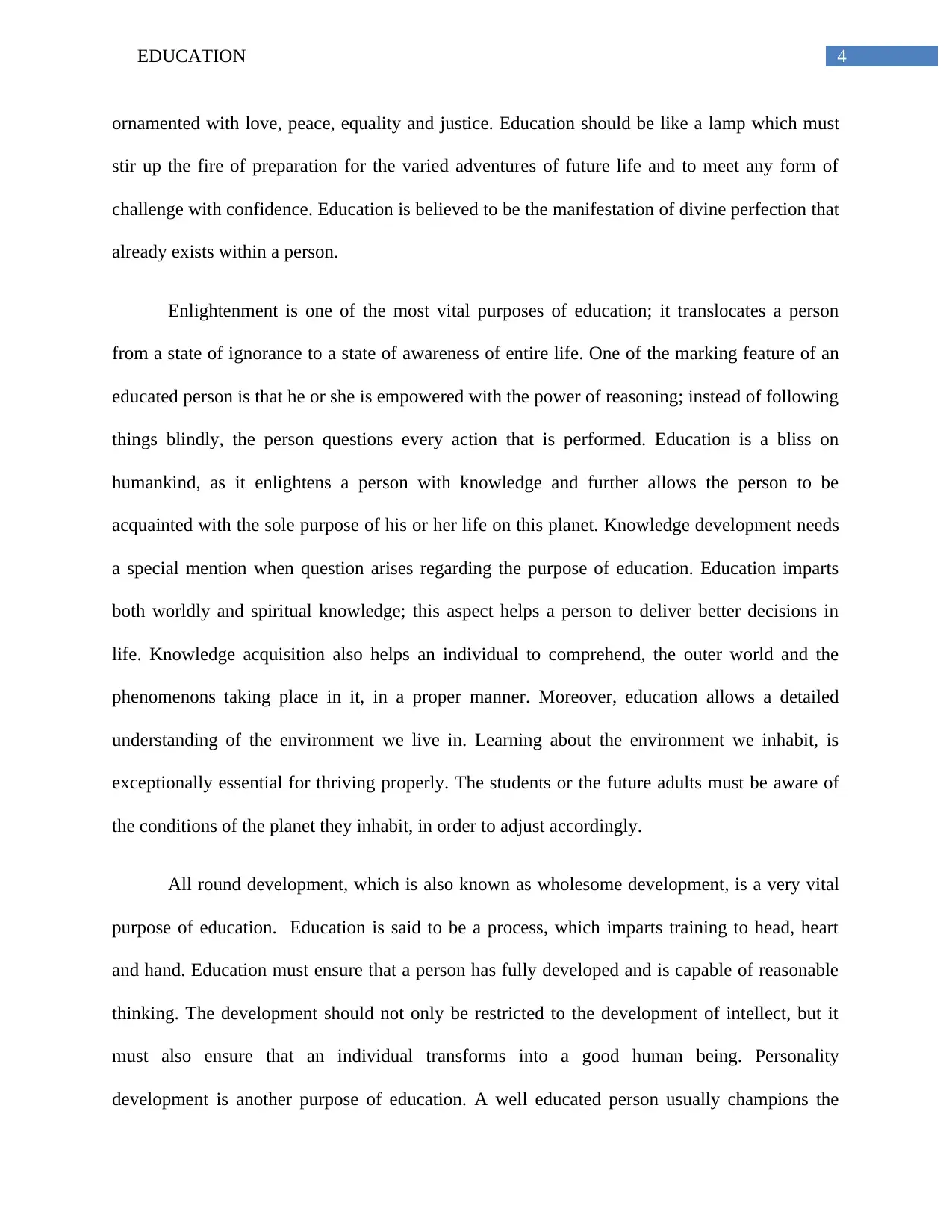
4EDUCATION
ornamented with love, peace, equality and justice. Education should be like a lamp which must
stir up the fire of preparation for the varied adventures of future life and to meet any form of
challenge with confidence. Education is believed to be the manifestation of divine perfection that
already exists within a person.
Enlightenment is one of the most vital purposes of education; it translocates a person
from a state of ignorance to a state of awareness of entire life. One of the marking feature of an
educated person is that he or she is empowered with the power of reasoning; instead of following
things blindly, the person questions every action that is performed. Education is a bliss on
humankind, as it enlightens a person with knowledge and further allows the person to be
acquainted with the sole purpose of his or her life on this planet. Knowledge development needs
a special mention when question arises regarding the purpose of education. Education imparts
both worldly and spiritual knowledge; this aspect helps a person to deliver better decisions in
life. Knowledge acquisition also helps an individual to comprehend, the outer world and the
phenomenons taking place in it, in a proper manner. Moreover, education allows a detailed
understanding of the environment we live in. Learning about the environment we inhabit, is
exceptionally essential for thriving properly. The students or the future adults must be aware of
the conditions of the planet they inhabit, in order to adjust accordingly.
All round development, which is also known as wholesome development, is a very vital
purpose of education. Education is said to be a process, which imparts training to head, heart
and hand. Education must ensure that a person has fully developed and is capable of reasonable
thinking. The development should not only be restricted to the development of intellect, but it
must also ensure that an individual transforms into a good human being. Personality
development is another purpose of education. A well educated person usually champions the
ornamented with love, peace, equality and justice. Education should be like a lamp which must
stir up the fire of preparation for the varied adventures of future life and to meet any form of
challenge with confidence. Education is believed to be the manifestation of divine perfection that
already exists within a person.
Enlightenment is one of the most vital purposes of education; it translocates a person
from a state of ignorance to a state of awareness of entire life. One of the marking feature of an
educated person is that he or she is empowered with the power of reasoning; instead of following
things blindly, the person questions every action that is performed. Education is a bliss on
humankind, as it enlightens a person with knowledge and further allows the person to be
acquainted with the sole purpose of his or her life on this planet. Knowledge development needs
a special mention when question arises regarding the purpose of education. Education imparts
both worldly and spiritual knowledge; this aspect helps a person to deliver better decisions in
life. Knowledge acquisition also helps an individual to comprehend, the outer world and the
phenomenons taking place in it, in a proper manner. Moreover, education allows a detailed
understanding of the environment we live in. Learning about the environment we inhabit, is
exceptionally essential for thriving properly. The students or the future adults must be aware of
the conditions of the planet they inhabit, in order to adjust accordingly.
All round development, which is also known as wholesome development, is a very vital
purpose of education. Education is said to be a process, which imparts training to head, heart
and hand. Education must ensure that a person has fully developed and is capable of reasonable
thinking. The development should not only be restricted to the development of intellect, but it
must also ensure that an individual transforms into a good human being. Personality
development is another purpose of education. A well educated person usually champions the
Paraphrase This Document
Need a fresh take? Get an instant paraphrase of this document with our AI Paraphraser
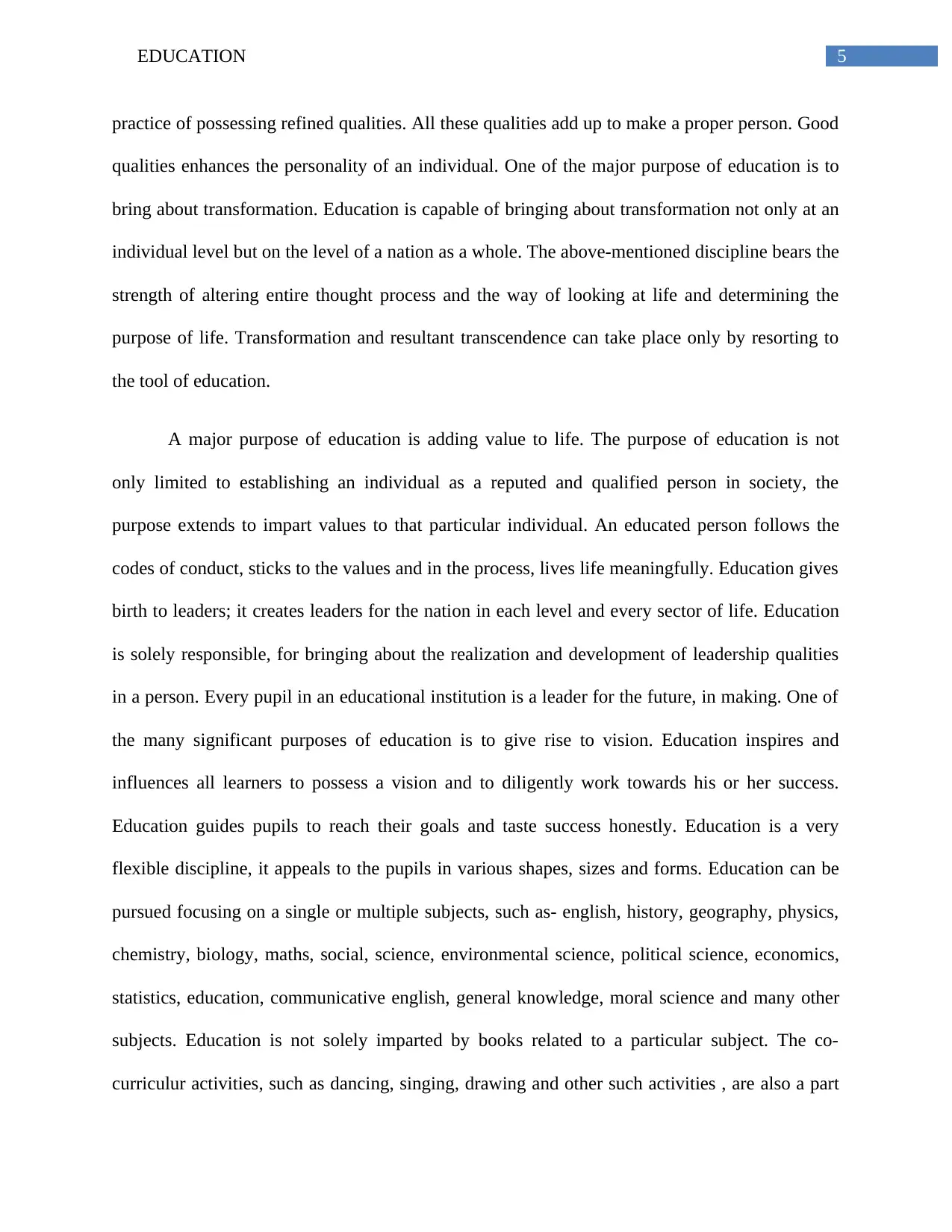
5EDUCATION
practice of possessing refined qualities. All these qualities add up to make a proper person. Good
qualities enhances the personality of an individual. One of the major purpose of education is to
bring about transformation. Education is capable of bringing about transformation not only at an
individual level but on the level of a nation as a whole. The above-mentioned discipline bears the
strength of altering entire thought process and the way of looking at life and determining the
purpose of life. Transformation and resultant transcendence can take place only by resorting to
the tool of education.
A major purpose of education is adding value to life. The purpose of education is not
only limited to establishing an individual as a reputed and qualified person in society, the
purpose extends to impart values to that particular individual. An educated person follows the
codes of conduct, sticks to the values and in the process, lives life meaningfully. Education gives
birth to leaders; it creates leaders for the nation in each level and every sector of life. Education
is solely responsible, for bringing about the realization and development of leadership qualities
in a person. Every pupil in an educational institution is a leader for the future, in making. One of
the many significant purposes of education is to give rise to vision. Education inspires and
influences all learners to possess a vision and to diligently work towards his or her success.
Education guides pupils to reach their goals and taste success honestly. Education is a very
flexible discipline, it appeals to the pupils in various shapes, sizes and forms. Education can be
pursued focusing on a single or multiple subjects, such as- english, history, geography, physics,
chemistry, biology, maths, social, science, environmental science, political science, economics,
statistics, education, communicative english, general knowledge, moral science and many other
subjects. Education is not solely imparted by books related to a particular subject. The co-
curriculur activities, such as dancing, singing, drawing and other such activities , are also a part
practice of possessing refined qualities. All these qualities add up to make a proper person. Good
qualities enhances the personality of an individual. One of the major purpose of education is to
bring about transformation. Education is capable of bringing about transformation not only at an
individual level but on the level of a nation as a whole. The above-mentioned discipline bears the
strength of altering entire thought process and the way of looking at life and determining the
purpose of life. Transformation and resultant transcendence can take place only by resorting to
the tool of education.
A major purpose of education is adding value to life. The purpose of education is not
only limited to establishing an individual as a reputed and qualified person in society, the
purpose extends to impart values to that particular individual. An educated person follows the
codes of conduct, sticks to the values and in the process, lives life meaningfully. Education gives
birth to leaders; it creates leaders for the nation in each level and every sector of life. Education
is solely responsible, for bringing about the realization and development of leadership qualities
in a person. Every pupil in an educational institution is a leader for the future, in making. One of
the many significant purposes of education is to give rise to vision. Education inspires and
influences all learners to possess a vision and to diligently work towards his or her success.
Education guides pupils to reach their goals and taste success honestly. Education is a very
flexible discipline, it appeals to the pupils in various shapes, sizes and forms. Education can be
pursued focusing on a single or multiple subjects, such as- english, history, geography, physics,
chemistry, biology, maths, social, science, environmental science, political science, economics,
statistics, education, communicative english, general knowledge, moral science and many other
subjects. Education is not solely imparted by books related to a particular subject. The co-
curriculur activities, such as dancing, singing, drawing and other such activities , are also a part
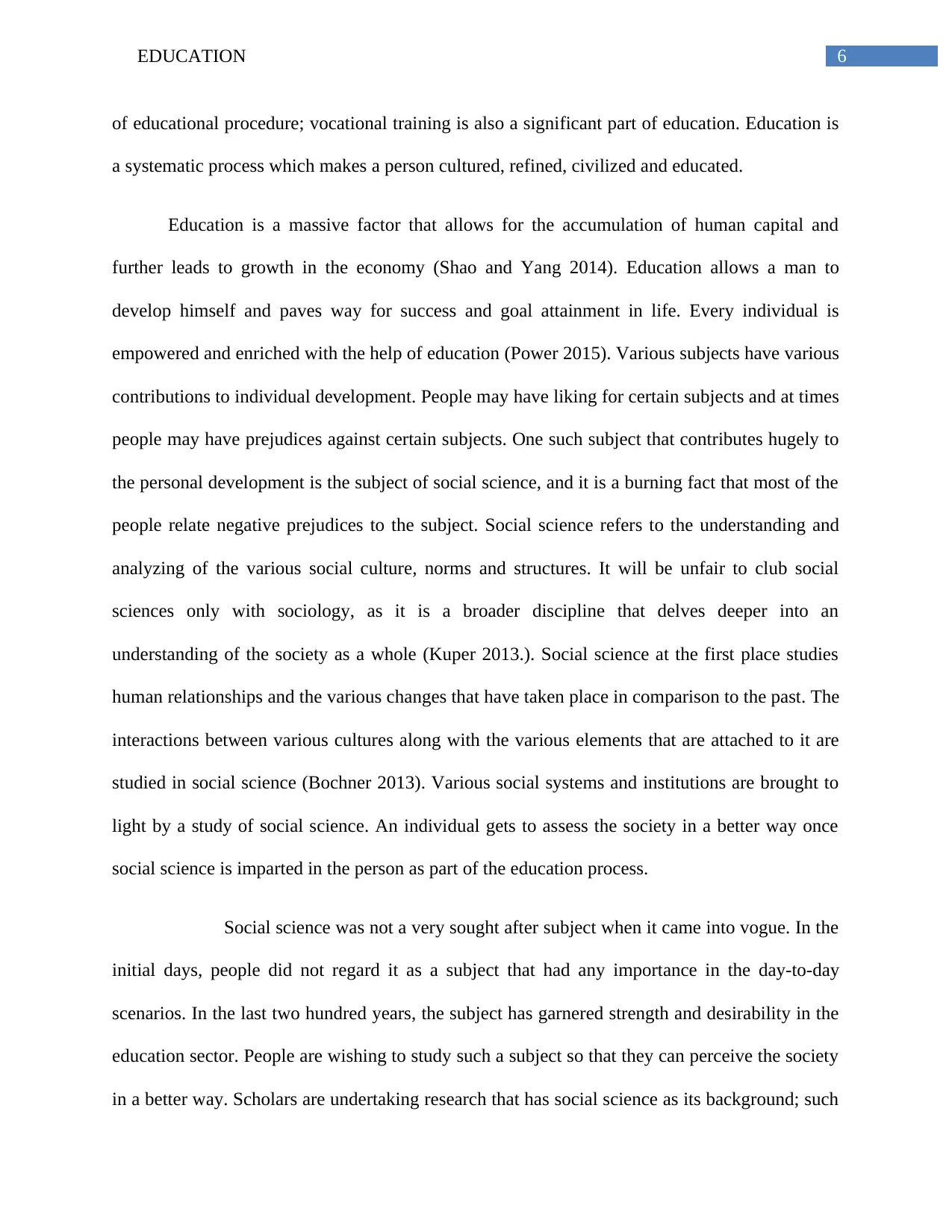
6EDUCATION
of educational procedure; vocational training is also a significant part of education. Education is
a systematic process which makes a person cultured, refined, civilized and educated.
Education is a massive factor that allows for the accumulation of human capital and
further leads to growth in the economy (Shao and Yang 2014). Education allows a man to
develop himself and paves way for success and goal attainment in life. Every individual is
empowered and enriched with the help of education (Power 2015). Various subjects have various
contributions to individual development. People may have liking for certain subjects and at times
people may have prejudices against certain subjects. One such subject that contributes hugely to
the personal development is the subject of social science, and it is a burning fact that most of the
people relate negative prejudices to the subject. Social science refers to the understanding and
analyzing of the various social culture, norms and structures. It will be unfair to club social
sciences only with sociology, as it is a broader discipline that delves deeper into an
understanding of the society as a whole (Kuper 2013.). Social science at the first place studies
human relationships and the various changes that have taken place in comparison to the past. The
interactions between various cultures along with the various elements that are attached to it are
studied in social science (Bochner 2013). Various social systems and institutions are brought to
light by a study of social science. An individual gets to assess the society in a better way once
social science is imparted in the person as part of the education process.
Social science was not a very sought after subject when it came into vogue. In the
initial days, people did not regard it as a subject that had any importance in the day-to-day
scenarios. In the last two hundred years, the subject has garnered strength and desirability in the
education sector. People are wishing to study such a subject so that they can perceive the society
in a better way. Scholars are undertaking research that has social science as its background; such
of educational procedure; vocational training is also a significant part of education. Education is
a systematic process which makes a person cultured, refined, civilized and educated.
Education is a massive factor that allows for the accumulation of human capital and
further leads to growth in the economy (Shao and Yang 2014). Education allows a man to
develop himself and paves way for success and goal attainment in life. Every individual is
empowered and enriched with the help of education (Power 2015). Various subjects have various
contributions to individual development. People may have liking for certain subjects and at times
people may have prejudices against certain subjects. One such subject that contributes hugely to
the personal development is the subject of social science, and it is a burning fact that most of the
people relate negative prejudices to the subject. Social science refers to the understanding and
analyzing of the various social culture, norms and structures. It will be unfair to club social
sciences only with sociology, as it is a broader discipline that delves deeper into an
understanding of the society as a whole (Kuper 2013.). Social science at the first place studies
human relationships and the various changes that have taken place in comparison to the past. The
interactions between various cultures along with the various elements that are attached to it are
studied in social science (Bochner 2013). Various social systems and institutions are brought to
light by a study of social science. An individual gets to assess the society in a better way once
social science is imparted in the person as part of the education process.
Social science was not a very sought after subject when it came into vogue. In the
initial days, people did not regard it as a subject that had any importance in the day-to-day
scenarios. In the last two hundred years, the subject has garnered strength and desirability in the
education sector. People are wishing to study such a subject so that they can perceive the society
in a better way. Scholars are undertaking research that has social science as its background; such
⊘ This is a preview!⊘
Do you want full access?
Subscribe today to unlock all pages.

Trusted by 1+ million students worldwide
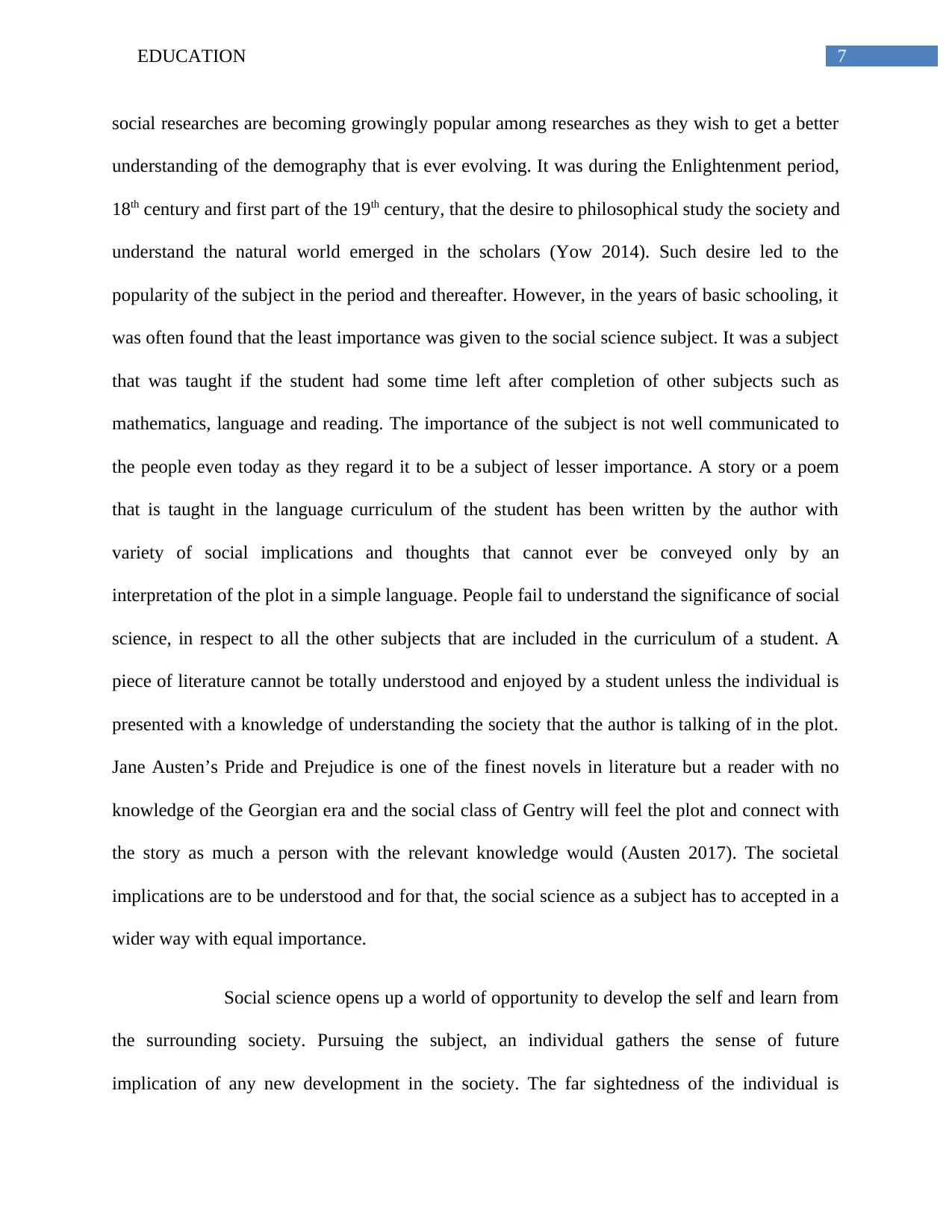
7EDUCATION
social researches are becoming growingly popular among researches as they wish to get a better
understanding of the demography that is ever evolving. It was during the Enlightenment period,
18th century and first part of the 19th century, that the desire to philosophical study the society and
understand the natural world emerged in the scholars (Yow 2014). Such desire led to the
popularity of the subject in the period and thereafter. However, in the years of basic schooling, it
was often found that the least importance was given to the social science subject. It was a subject
that was taught if the student had some time left after completion of other subjects such as
mathematics, language and reading. The importance of the subject is not well communicated to
the people even today as they regard it to be a subject of lesser importance. A story or a poem
that is taught in the language curriculum of the student has been written by the author with
variety of social implications and thoughts that cannot ever be conveyed only by an
interpretation of the plot in a simple language. People fail to understand the significance of social
science, in respect to all the other subjects that are included in the curriculum of a student. A
piece of literature cannot be totally understood and enjoyed by a student unless the individual is
presented with a knowledge of understanding the society that the author is talking of in the plot.
Jane Austen’s Pride and Prejudice is one of the finest novels in literature but a reader with no
knowledge of the Georgian era and the social class of Gentry will feel the plot and connect with
the story as much a person with the relevant knowledge would (Austen 2017). The societal
implications are to be understood and for that, the social science as a subject has to accepted in a
wider way with equal importance.
Social science opens up a world of opportunity to develop the self and learn from
the surrounding society. Pursuing the subject, an individual gathers the sense of future
implication of any new development in the society. The far sightedness of the individual is
social researches are becoming growingly popular among researches as they wish to get a better
understanding of the demography that is ever evolving. It was during the Enlightenment period,
18th century and first part of the 19th century, that the desire to philosophical study the society and
understand the natural world emerged in the scholars (Yow 2014). Such desire led to the
popularity of the subject in the period and thereafter. However, in the years of basic schooling, it
was often found that the least importance was given to the social science subject. It was a subject
that was taught if the student had some time left after completion of other subjects such as
mathematics, language and reading. The importance of the subject is not well communicated to
the people even today as they regard it to be a subject of lesser importance. A story or a poem
that is taught in the language curriculum of the student has been written by the author with
variety of social implications and thoughts that cannot ever be conveyed only by an
interpretation of the plot in a simple language. People fail to understand the significance of social
science, in respect to all the other subjects that are included in the curriculum of a student. A
piece of literature cannot be totally understood and enjoyed by a student unless the individual is
presented with a knowledge of understanding the society that the author is talking of in the plot.
Jane Austen’s Pride and Prejudice is one of the finest novels in literature but a reader with no
knowledge of the Georgian era and the social class of Gentry will feel the plot and connect with
the story as much a person with the relevant knowledge would (Austen 2017). The societal
implications are to be understood and for that, the social science as a subject has to accepted in a
wider way with equal importance.
Social science opens up a world of opportunity to develop the self and learn from
the surrounding society. Pursuing the subject, an individual gathers the sense of future
implication of any new development in the society. The far sightedness of the individual is
Paraphrase This Document
Need a fresh take? Get an instant paraphrase of this document with our AI Paraphraser
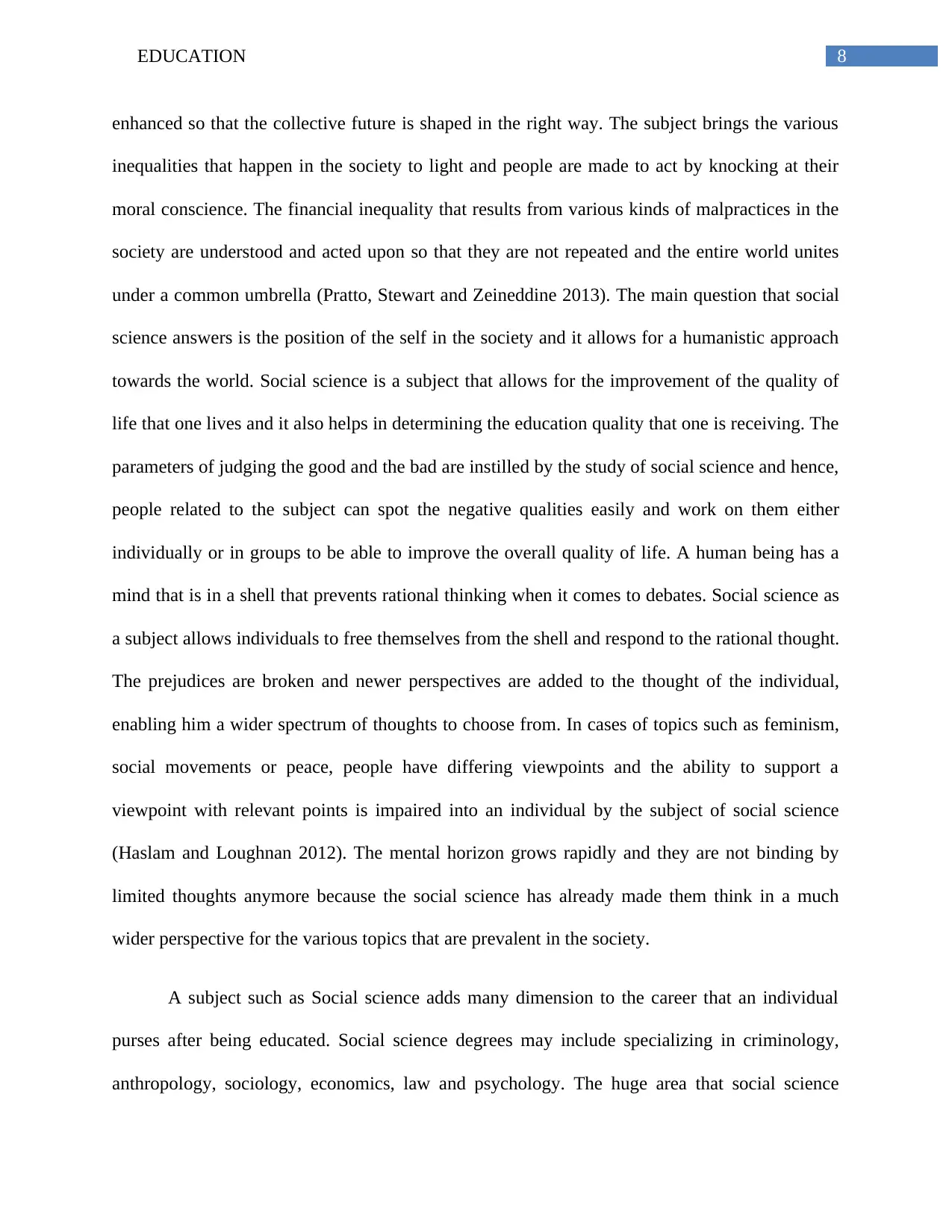
8EDUCATION
enhanced so that the collective future is shaped in the right way. The subject brings the various
inequalities that happen in the society to light and people are made to act by knocking at their
moral conscience. The financial inequality that results from various kinds of malpractices in the
society are understood and acted upon so that they are not repeated and the entire world unites
under a common umbrella (Pratto, Stewart and Zeineddine 2013). The main question that social
science answers is the position of the self in the society and it allows for a humanistic approach
towards the world. Social science is a subject that allows for the improvement of the quality of
life that one lives and it also helps in determining the education quality that one is receiving. The
parameters of judging the good and the bad are instilled by the study of social science and hence,
people related to the subject can spot the negative qualities easily and work on them either
individually or in groups to be able to improve the overall quality of life. A human being has a
mind that is in a shell that prevents rational thinking when it comes to debates. Social science as
a subject allows individuals to free themselves from the shell and respond to the rational thought.
The prejudices are broken and newer perspectives are added to the thought of the individual,
enabling him a wider spectrum of thoughts to choose from. In cases of topics such as feminism,
social movements or peace, people have differing viewpoints and the ability to support a
viewpoint with relevant points is impaired into an individual by the subject of social science
(Haslam and Loughnan 2012). The mental horizon grows rapidly and they are not binding by
limited thoughts anymore because the social science has already made them think in a much
wider perspective for the various topics that are prevalent in the society.
A subject such as Social science adds many dimension to the career that an individual
purses after being educated. Social science degrees may include specializing in criminology,
anthropology, sociology, economics, law and psychology. The huge area that social science
enhanced so that the collective future is shaped in the right way. The subject brings the various
inequalities that happen in the society to light and people are made to act by knocking at their
moral conscience. The financial inequality that results from various kinds of malpractices in the
society are understood and acted upon so that they are not repeated and the entire world unites
under a common umbrella (Pratto, Stewart and Zeineddine 2013). The main question that social
science answers is the position of the self in the society and it allows for a humanistic approach
towards the world. Social science is a subject that allows for the improvement of the quality of
life that one lives and it also helps in determining the education quality that one is receiving. The
parameters of judging the good and the bad are instilled by the study of social science and hence,
people related to the subject can spot the negative qualities easily and work on them either
individually or in groups to be able to improve the overall quality of life. A human being has a
mind that is in a shell that prevents rational thinking when it comes to debates. Social science as
a subject allows individuals to free themselves from the shell and respond to the rational thought.
The prejudices are broken and newer perspectives are added to the thought of the individual,
enabling him a wider spectrum of thoughts to choose from. In cases of topics such as feminism,
social movements or peace, people have differing viewpoints and the ability to support a
viewpoint with relevant points is impaired into an individual by the subject of social science
(Haslam and Loughnan 2012). The mental horizon grows rapidly and they are not binding by
limited thoughts anymore because the social science has already made them think in a much
wider perspective for the various topics that are prevalent in the society.
A subject such as Social science adds many dimension to the career that an individual
purses after being educated. Social science degrees may include specializing in criminology,
anthropology, sociology, economics, law and psychology. The huge area that social science
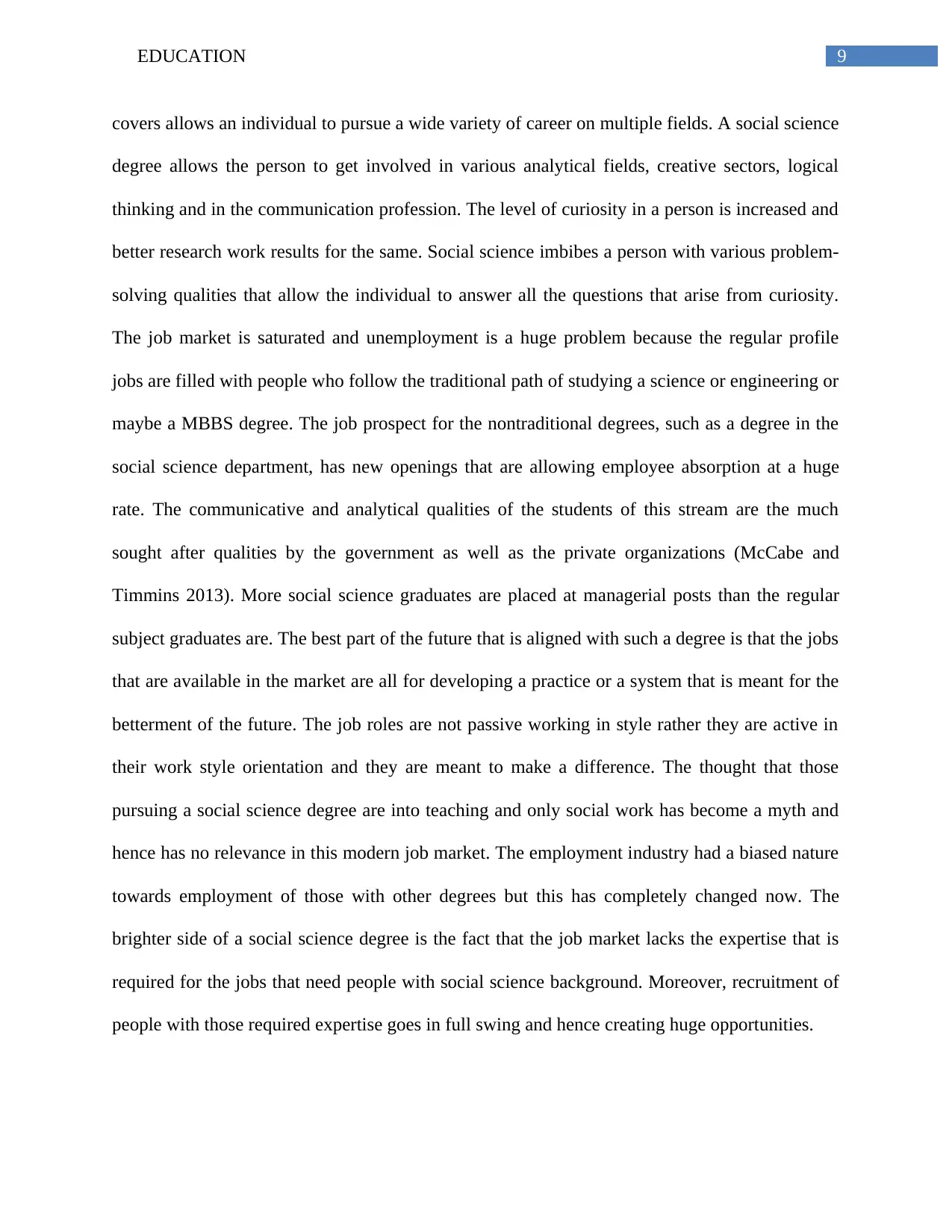
9EDUCATION
covers allows an individual to pursue a wide variety of career on multiple fields. A social science
degree allows the person to get involved in various analytical fields, creative sectors, logical
thinking and in the communication profession. The level of curiosity in a person is increased and
better research work results for the same. Social science imbibes a person with various problem-
solving qualities that allow the individual to answer all the questions that arise from curiosity.
The job market is saturated and unemployment is a huge problem because the regular profile
jobs are filled with people who follow the traditional path of studying a science or engineering or
maybe a MBBS degree. The job prospect for the nontraditional degrees, such as a degree in the
social science department, has new openings that are allowing employee absorption at a huge
rate. The communicative and analytical qualities of the students of this stream are the much
sought after qualities by the government as well as the private organizations (McCabe and
Timmins 2013). More social science graduates are placed at managerial posts than the regular
subject graduates are. The best part of the future that is aligned with such a degree is that the jobs
that are available in the market are all for developing a practice or a system that is meant for the
betterment of the future. The job roles are not passive working in style rather they are active in
their work style orientation and they are meant to make a difference. The thought that those
pursuing a social science degree are into teaching and only social work has become a myth and
hence has no relevance in this modern job market. The employment industry had a biased nature
towards employment of those with other degrees but this has completely changed now. The
brighter side of a social science degree is the fact that the job market lacks the expertise that is
required for the jobs that need people with social science background. Moreover, recruitment of
people with those required expertise goes in full swing and hence creating huge opportunities.
covers allows an individual to pursue a wide variety of career on multiple fields. A social science
degree allows the person to get involved in various analytical fields, creative sectors, logical
thinking and in the communication profession. The level of curiosity in a person is increased and
better research work results for the same. Social science imbibes a person with various problem-
solving qualities that allow the individual to answer all the questions that arise from curiosity.
The job market is saturated and unemployment is a huge problem because the regular profile
jobs are filled with people who follow the traditional path of studying a science or engineering or
maybe a MBBS degree. The job prospect for the nontraditional degrees, such as a degree in the
social science department, has new openings that are allowing employee absorption at a huge
rate. The communicative and analytical qualities of the students of this stream are the much
sought after qualities by the government as well as the private organizations (McCabe and
Timmins 2013). More social science graduates are placed at managerial posts than the regular
subject graduates are. The best part of the future that is aligned with such a degree is that the jobs
that are available in the market are all for developing a practice or a system that is meant for the
betterment of the future. The job roles are not passive working in style rather they are active in
their work style orientation and they are meant to make a difference. The thought that those
pursuing a social science degree are into teaching and only social work has become a myth and
hence has no relevance in this modern job market. The employment industry had a biased nature
towards employment of those with other degrees but this has completely changed now. The
brighter side of a social science degree is the fact that the job market lacks the expertise that is
required for the jobs that need people with social science background. Moreover, recruitment of
people with those required expertise goes in full swing and hence creating huge opportunities.
⊘ This is a preview!⊘
Do you want full access?
Subscribe today to unlock all pages.

Trusted by 1+ million students worldwide
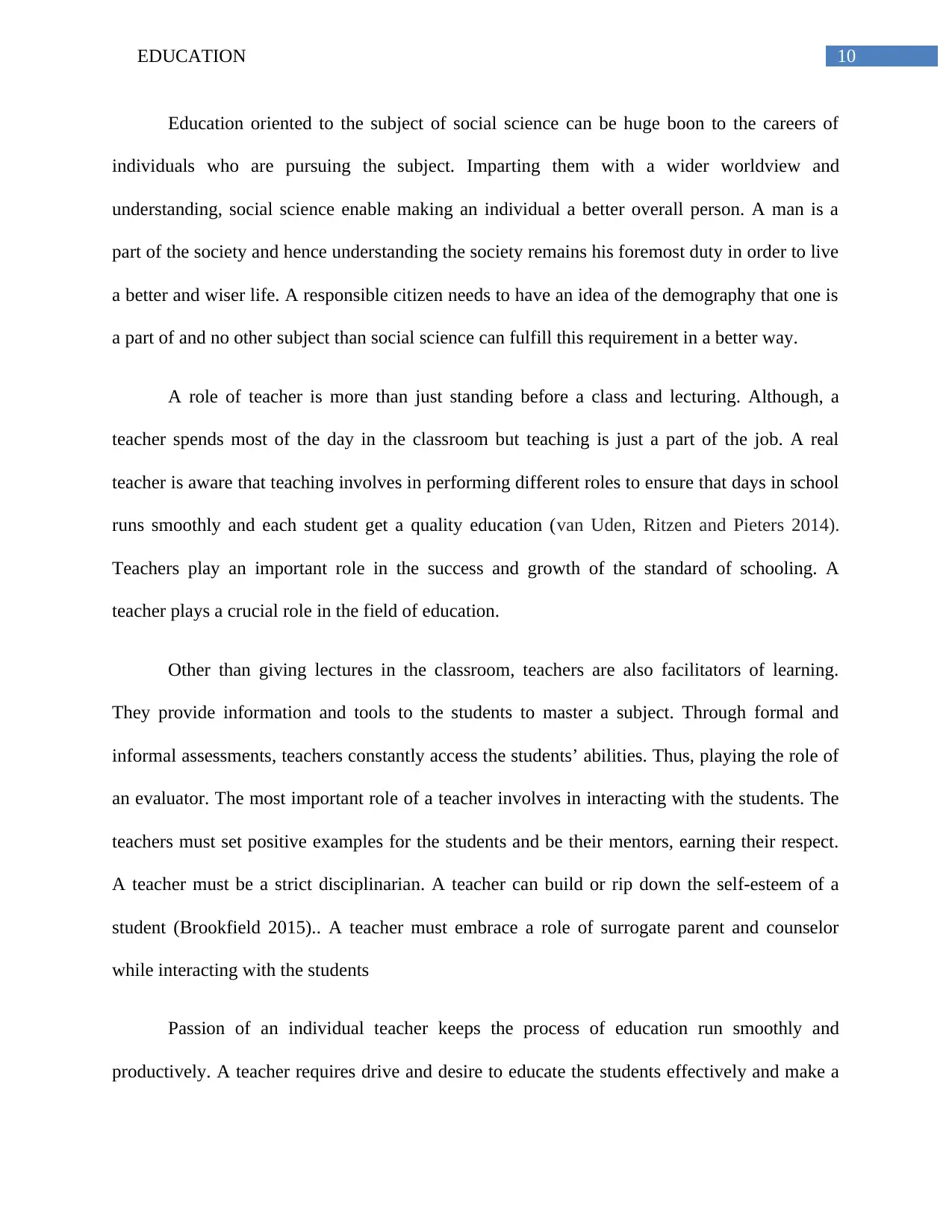
10EDUCATION
Education oriented to the subject of social science can be huge boon to the careers of
individuals who are pursuing the subject. Imparting them with a wider worldview and
understanding, social science enable making an individual a better overall person. A man is a
part of the society and hence understanding the society remains his foremost duty in order to live
a better and wiser life. A responsible citizen needs to have an idea of the demography that one is
a part of and no other subject than social science can fulfill this requirement in a better way.
A role of teacher is more than just standing before a class and lecturing. Although, a
teacher spends most of the day in the classroom but teaching is just a part of the job. A real
teacher is aware that teaching involves in performing different roles to ensure that days in school
runs smoothly and each student get a quality education (van Uden, Ritzen and Pieters 2014).
Teachers play an important role in the success and growth of the standard of schooling. A
teacher plays a crucial role in the field of education.
Other than giving lectures in the classroom, teachers are also facilitators of learning.
They provide information and tools to the students to master a subject. Through formal and
informal assessments, teachers constantly access the students’ abilities. Thus, playing the role of
an evaluator. The most important role of a teacher involves in interacting with the students. The
teachers must set positive examples for the students and be their mentors, earning their respect.
A teacher must be a strict disciplinarian. A teacher can build or rip down the self-esteem of a
student (Brookfield 2015).. A teacher must embrace a role of surrogate parent and counselor
while interacting with the students
Passion of an individual teacher keeps the process of education run smoothly and
productively. A teacher requires drive and desire to educate the students effectively and make a
Education oriented to the subject of social science can be huge boon to the careers of
individuals who are pursuing the subject. Imparting them with a wider worldview and
understanding, social science enable making an individual a better overall person. A man is a
part of the society and hence understanding the society remains his foremost duty in order to live
a better and wiser life. A responsible citizen needs to have an idea of the demography that one is
a part of and no other subject than social science can fulfill this requirement in a better way.
A role of teacher is more than just standing before a class and lecturing. Although, a
teacher spends most of the day in the classroom but teaching is just a part of the job. A real
teacher is aware that teaching involves in performing different roles to ensure that days in school
runs smoothly and each student get a quality education (van Uden, Ritzen and Pieters 2014).
Teachers play an important role in the success and growth of the standard of schooling. A
teacher plays a crucial role in the field of education.
Other than giving lectures in the classroom, teachers are also facilitators of learning.
They provide information and tools to the students to master a subject. Through formal and
informal assessments, teachers constantly access the students’ abilities. Thus, playing the role of
an evaluator. The most important role of a teacher involves in interacting with the students. The
teachers must set positive examples for the students and be their mentors, earning their respect.
A teacher must be a strict disciplinarian. A teacher can build or rip down the self-esteem of a
student (Brookfield 2015).. A teacher must embrace a role of surrogate parent and counselor
while interacting with the students
Passion of an individual teacher keeps the process of education run smoothly and
productively. A teacher requires drive and desire to educate the students effectively and make a
Paraphrase This Document
Need a fresh take? Get an instant paraphrase of this document with our AI Paraphraser
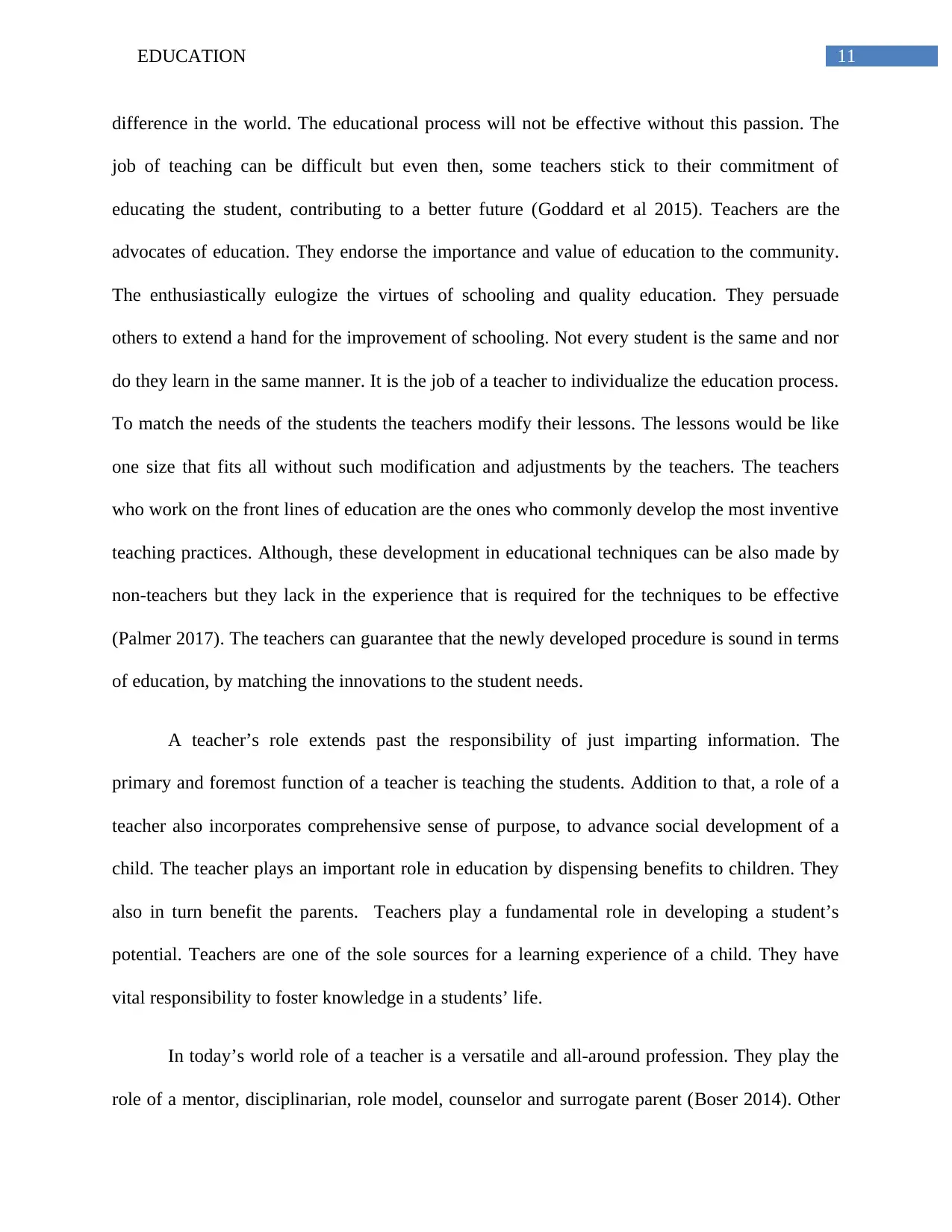
11EDUCATION
difference in the world. The educational process will not be effective without this passion. The
job of teaching can be difficult but even then, some teachers stick to their commitment of
educating the student, contributing to a better future (Goddard et al 2015). Teachers are the
advocates of education. They endorse the importance and value of education to the community.
The enthusiastically eulogize the virtues of schooling and quality education. They persuade
others to extend a hand for the improvement of schooling. Not every student is the same and nor
do they learn in the same manner. It is the job of a teacher to individualize the education process.
To match the needs of the students the teachers modify their lessons. The lessons would be like
one size that fits all without such modification and adjustments by the teachers. The teachers
who work on the front lines of education are the ones who commonly develop the most inventive
teaching practices. Although, these development in educational techniques can be also made by
non-teachers but they lack in the experience that is required for the techniques to be effective
(Palmer 2017). The teachers can guarantee that the newly developed procedure is sound in terms
of education, by matching the innovations to the student needs.
A teacher’s role extends past the responsibility of just imparting information. The
primary and foremost function of a teacher is teaching the students. Addition to that, a role of a
teacher also incorporates comprehensive sense of purpose, to advance social development of a
child. The teacher plays an important role in education by dispensing benefits to children. They
also in turn benefit the parents. Teachers play a fundamental role in developing a student’s
potential. Teachers are one of the sole sources for a learning experience of a child. They have
vital responsibility to foster knowledge in a students’ life.
In today’s world role of a teacher is a versatile and all-around profession. They play the
role of a mentor, disciplinarian, role model, counselor and surrogate parent (Boser 2014). Other
difference in the world. The educational process will not be effective without this passion. The
job of teaching can be difficult but even then, some teachers stick to their commitment of
educating the student, contributing to a better future (Goddard et al 2015). Teachers are the
advocates of education. They endorse the importance and value of education to the community.
The enthusiastically eulogize the virtues of schooling and quality education. They persuade
others to extend a hand for the improvement of schooling. Not every student is the same and nor
do they learn in the same manner. It is the job of a teacher to individualize the education process.
To match the needs of the students the teachers modify their lessons. The lessons would be like
one size that fits all without such modification and adjustments by the teachers. The teachers
who work on the front lines of education are the ones who commonly develop the most inventive
teaching practices. Although, these development in educational techniques can be also made by
non-teachers but they lack in the experience that is required for the techniques to be effective
(Palmer 2017). The teachers can guarantee that the newly developed procedure is sound in terms
of education, by matching the innovations to the student needs.
A teacher’s role extends past the responsibility of just imparting information. The
primary and foremost function of a teacher is teaching the students. Addition to that, a role of a
teacher also incorporates comprehensive sense of purpose, to advance social development of a
child. The teacher plays an important role in education by dispensing benefits to children. They
also in turn benefit the parents. Teachers play a fundamental role in developing a student’s
potential. Teachers are one of the sole sources for a learning experience of a child. They have
vital responsibility to foster knowledge in a students’ life.
In today’s world role of a teacher is a versatile and all-around profession. They play the
role of a mentor, disciplinarian, role model, counselor and surrogate parent (Boser 2014). Other
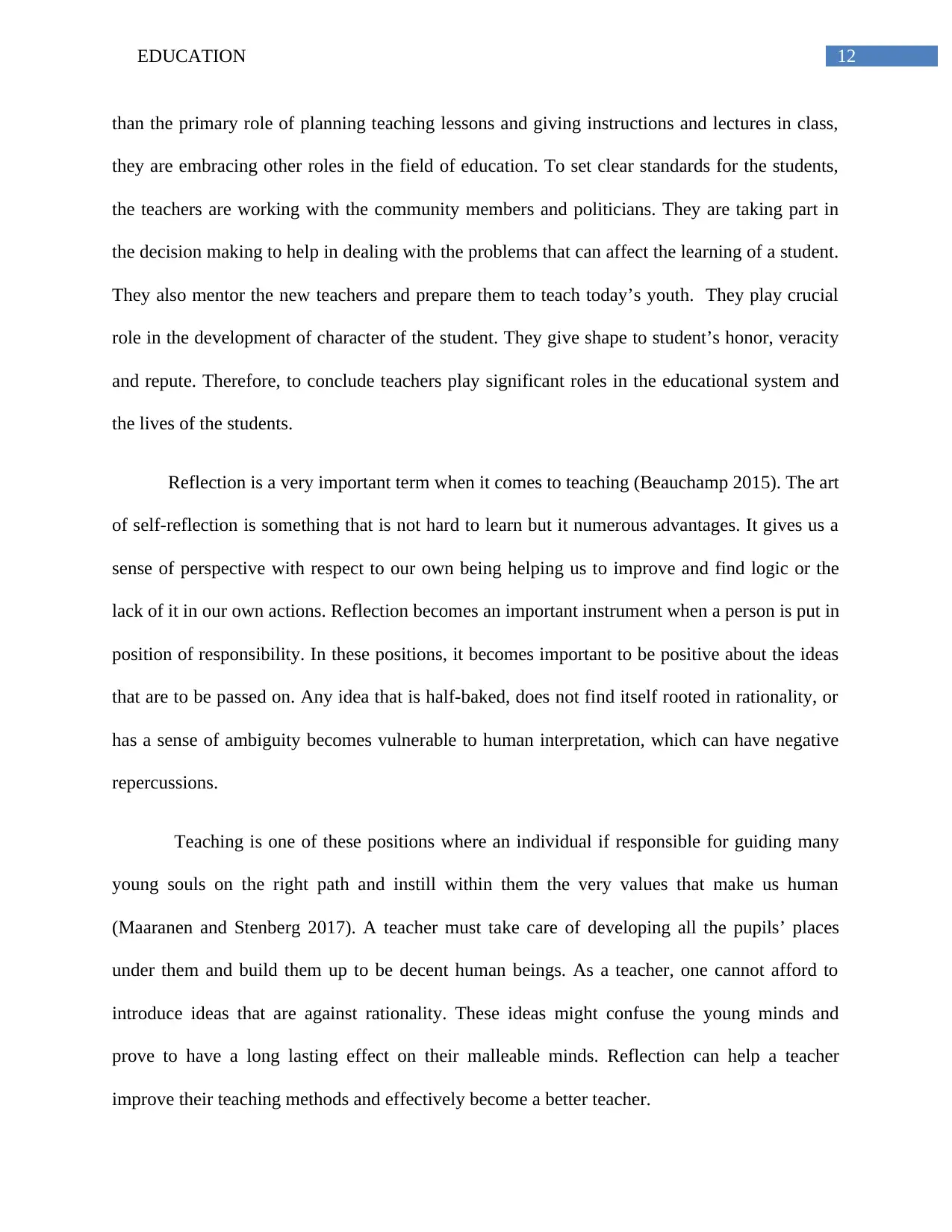
12EDUCATION
than the primary role of planning teaching lessons and giving instructions and lectures in class,
they are embracing other roles in the field of education. To set clear standards for the students,
the teachers are working with the community members and politicians. They are taking part in
the decision making to help in dealing with the problems that can affect the learning of a student.
They also mentor the new teachers and prepare them to teach today’s youth. They play crucial
role in the development of character of the student. They give shape to student’s honor, veracity
and repute. Therefore, to conclude teachers play significant roles in the educational system and
the lives of the students.
Reflection is a very important term when it comes to teaching (Beauchamp 2015). The art
of self-reflection is something that is not hard to learn but it numerous advantages. It gives us a
sense of perspective with respect to our own being helping us to improve and find logic or the
lack of it in our own actions. Reflection becomes an important instrument when a person is put in
position of responsibility. In these positions, it becomes important to be positive about the ideas
that are to be passed on. Any idea that is half-baked, does not find itself rooted in rationality, or
has a sense of ambiguity becomes vulnerable to human interpretation, which can have negative
repercussions.
Teaching is one of these positions where an individual if responsible for guiding many
young souls on the right path and instill within them the very values that make us human
(Maaranen and Stenberg 2017). A teacher must take care of developing all the pupils’ places
under them and build them up to be decent human beings. As a teacher, one cannot afford to
introduce ideas that are against rationality. These ideas might confuse the young minds and
prove to have a long lasting effect on their malleable minds. Reflection can help a teacher
improve their teaching methods and effectively become a better teacher.
than the primary role of planning teaching lessons and giving instructions and lectures in class,
they are embracing other roles in the field of education. To set clear standards for the students,
the teachers are working with the community members and politicians. They are taking part in
the decision making to help in dealing with the problems that can affect the learning of a student.
They also mentor the new teachers and prepare them to teach today’s youth. They play crucial
role in the development of character of the student. They give shape to student’s honor, veracity
and repute. Therefore, to conclude teachers play significant roles in the educational system and
the lives of the students.
Reflection is a very important term when it comes to teaching (Beauchamp 2015). The art
of self-reflection is something that is not hard to learn but it numerous advantages. It gives us a
sense of perspective with respect to our own being helping us to improve and find logic or the
lack of it in our own actions. Reflection becomes an important instrument when a person is put in
position of responsibility. In these positions, it becomes important to be positive about the ideas
that are to be passed on. Any idea that is half-baked, does not find itself rooted in rationality, or
has a sense of ambiguity becomes vulnerable to human interpretation, which can have negative
repercussions.
Teaching is one of these positions where an individual if responsible for guiding many
young souls on the right path and instill within them the very values that make us human
(Maaranen and Stenberg 2017). A teacher must take care of developing all the pupils’ places
under them and build them up to be decent human beings. As a teacher, one cannot afford to
introduce ideas that are against rationality. These ideas might confuse the young minds and
prove to have a long lasting effect on their malleable minds. Reflection can help a teacher
improve their teaching methods and effectively become a better teacher.
⊘ This is a preview!⊘
Do you want full access?
Subscribe today to unlock all pages.

Trusted by 1+ million students worldwide
1 out of 18
Related Documents
Your All-in-One AI-Powered Toolkit for Academic Success.
+13062052269
info@desklib.com
Available 24*7 on WhatsApp / Email
![[object Object]](/_next/static/media/star-bottom.7253800d.svg)
Unlock your academic potential
Copyright © 2020–2025 A2Z Services. All Rights Reserved. Developed and managed by ZUCOL.





